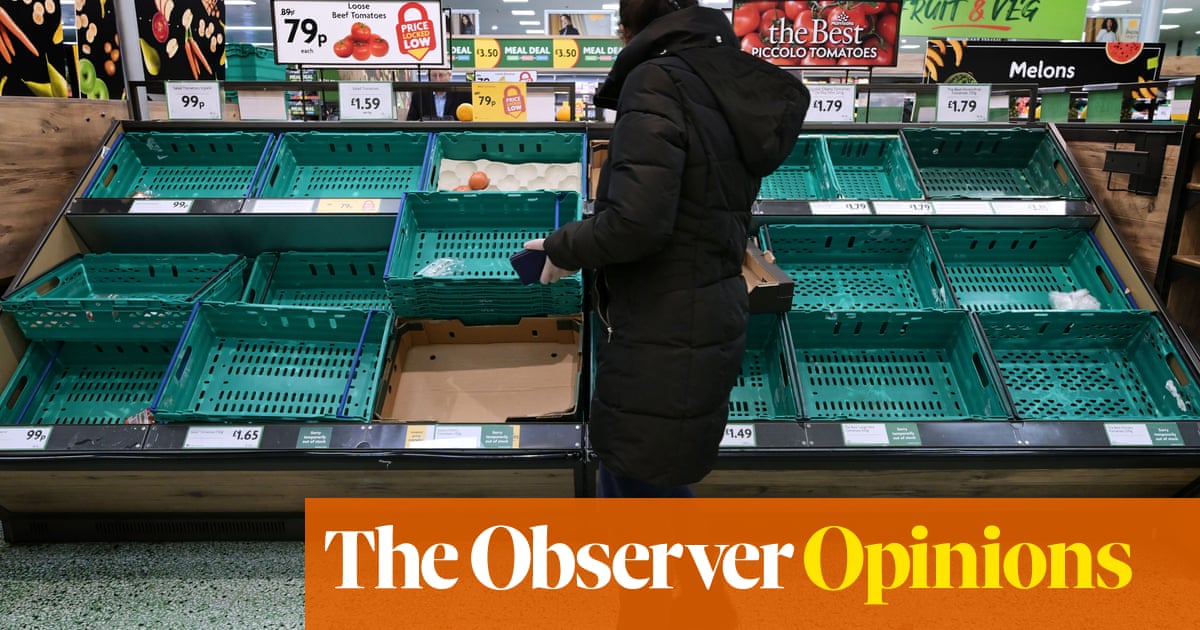
In October 2014 I told the Defra select committee that we needed to start paying more for our food. If we did not do so, we risked paying vastly more later and experiencing shortages in supply, resulting in empty shelves. For decades the supermarket sector had been given a free run at our food supply chain by governments of both stripes. Just a dozen companies then controlled 95% of UK food retail and used that economic might to force such drastically tight deals on producers that many had gone out of business. Our self-sufficiency had withered. We were now, I said, at serious risk from external shocks disrupting our food supply because we were so dependent on imports.
I didn’t expect one of those external shocks to be self-inflicted, but then the Brexit vote came along. Anyone with even a passing knowledge of how deformed our food system had become knew it would have a drastic impact.
And now here we are in 2023, with shelves emptied of salad vegetables and rationing in supermarkets. Is it solely a product of our leaving the EU? No, of course not – a fact that bug-eyed Brexiters cling to. Yes, there have been weather issues. But isn’t it curious that the supply problems we have here are not being replicated in France, Spain or even Ukraine; that social media is plump with pictures of their stores groaning with fresh produce?
We are capable of growing salad vegetables under glass in the UK all year around – not enough to meet supply, but certainly enough to deal with shortfalls. There are those who claim grandly that there’s something intrinsically distasteful and wrong about eating such foods out of season; that, as environment secretary Thérèse Coffey said last week, we should make do with turnips. That’s to misunderstand the history of agriculture. Humanity has been interfering with how and when crops grow since wild grasses were first domesticated on the banks of the Nile thousands of years ago. It’s called progress.
The problem is that growing salad vegetables in the UK has been made economically unviable, both by those shortsighted supermarkets and in large part by Brexit. Growers in the Lea Valley around London, regarded as Britain’s salad bowl, have started applying to knock down dozens of acres of greenhouses so the land can be used more profitably for houses. As the Lea Valley Growers Association has explained, the post-Brexit seasonal workers’ scheme only granted six-month visas when they were needed for nine months. It meant bringing in two cohorts and double the training. That means extra costs which are not being met by supermarkets.
Then came the energy crisis. The government chose not to subsidise the energy costs of growers. Last week APS group, one of the largest tomato growers in the country, admitted they had left some of their glasshouses unplanted for the first time in almost 75 years.
Some will argue that the supermarkets are refusing to pay more because they can’t pass on the costs to already hard-pressed consumers battling a cost of living crisis; that to suggest we should pay more for our food when so many are reduced to using food banks is a grossly insensitive argument made from a place of affluence. But if we structure our food system so that those in poverty can access it, we will only further damage our agricultural base. We need on the one hand to deal with the functioning of our food system and on the other with poverty, with a chronically unequal distribution of wealth. We need to stop talking about food poverty and just call it poverty.
Turning to overseas markets for our supply when there has been disruption does not, of course, make things cheaper. It makes them vastly more expensive. The supermarkets have been able to get some stock, but wholesalers supplying other parts of the economy, like the hospitality sector and independent shops, have been left very short. Supermarket rationing has been introduced in part to stop those smaller businesses buying what they need from supermarkets.
And why is the UK not being supplied as once it was? Could it have something to do with getting trucks through borders mired in post-Brexit paperwork? Dutch lorry drivers complained last week on social media about border checks adding hours to their shifts. Far easier, then, to get stock to supermarkets across a borderless Schengen zone.
This is the problem with running down British agriculture and depending on imports. In 2006 Labour published a paper on food security nicknamed in food circles the “leave it to Tesco” report because it argued that in a globalised world a rich UK could buy its way out of any supply issues. It failed to recognise the growing dominance of emerging economies like India and China, which were buying the crops we wanted. But at least we had the EU and the ease of supply. And then we left it.
In a few weeks, perhaps a few months, the current problems will ease. The shelves will fill again. Those with an interest in doing so will insist it was just a blip. It isn’t just a blip. It’s a symptom of a dysfunctional food system. It’s a symptom of an overly mighty supermarket sector failing to behave like the custodian of the food supply chain it has become. And yes, it’s also a symptom of Brexit.
You can blame the weather and Brexit. But there’s more to the UK’s food supply crisis - The Guardian
Read More

No comments:
Post a Comment